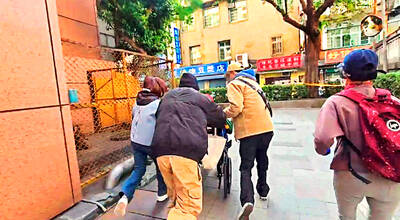One-hundred-and-fifty media researchers cosigned a statement this week in protest at the Want Want Group filing lawsuits against reporters and college professors it deemed hostile to its acquisition of the China Times Group.
The statement includes the signatures of professors and deans of communication colleges from 13 public and private universities around the country. Four media researchers held a press conference at the Legislative Yuan yesterday to release the statement and signatures.
The Want Want Group has been running advertisements in the Chinese-language China Times and Commercial Times since last month attacking the National Communications Commission (NCC) for the conditional approval it issued for Want Want’s management change at China Television Co and CTiTV.
CONDITIONAL APPROVAL
The Want Want Group singled out three NCC commissioners who it said would be held responsible for any damage caused by the conditional approval.
In the ads, the group asked people who had made “defamatory” remarks about the group or its chairman, Tsai Eng-meng (蔡衍明), to apologize immediately, or else face legal charges.
Last week, Media Watch chairman Kuan Chung-hsiag (管中祥), Wealth Magazine editor Tien Hsi-ju (田習如) and Association of Taiwan Journalists chairman Leon Chuang (莊豐嘉) said they had received legal notices from Want Want.
Feng Chien-san (馮建三), a journalism professor at National Chengchi University, said whether the NCC had abused its authority was open to discussion.
“The action we [media researchers] take today is to condemn the Want Want Group for the damage it has caused to freedom of speech and journalism,” Feng said.
“We have collected 150 signatures within three days, and this is perhaps the first time the nation’s researchers have taken such a clear stand on a public issue,” Feng said.
Su Herng (蘇蘅), head of the journalism department at National Chengchi University, said many people wondered whether Want Want’s purchase of the China Times Group would generate an upward or a downward spiral in the media in Taiwan.
‘DARK FORCE’
“But judging from a series of actions the China Times has taken since last year against media researchers, the acquisition seems to be destroying professional journalism and is creating a crisis for freedom of the press,” Su said.
“A dark force has emerged in the reconstruction process of the Taiwanese media,” Su added.
In response, Want Want Group spokesperson Wu Ken-cheng (吳根成) said the group respected the researchers’ knowledge and would humbly accept their opinions and criticism.
However, “Can people still claim freedom of speech if they make baseless charges that tarnish a corporation’s image?” Wu asked.

Taiwan must first strengthen its own national defense to deter a potential invasion by China as cross-strait tensions continue to rise, multiple European lawmakers said on Friday. In a media interview in Taipei marking the conclusion of an eight-member European parliamentary delegation’s six-day visit to Taiwan, the lawmakers urged Taipei to remain vigilant and increase defense spending. “All those who claim they want to protect you actually want to conquer you,” Ukrainian lawmaker Serhii Soboliev said when asked what lessons Taiwan could draw from Russia’s invasion of Ukraine. Soboliev described the Kremlin as a “new fascist Nazi regime” that justified

The US House of Representatives yesterday passed the PROTECT Taiwan Act, which stipulates that Washington would exclude China from participating in major global financial organizations if its actions directly threaten Taiwan’s security. The bill, proposed by Republican US Representative Frank Lucas, passed with 395 votes in favor and two against. It stipulates that if China’s actions pose any threat to Taiwan’s security, economic or social systems, the US would, “to the maximum extent practicable,” exclude China from international financial institutions, including the G20, the Bank for International Settlements and the Financial Stability Board. The bill makes it clear that China

‘T-DOME’: IBCS would increase Taiwan’s defense capabilities, enabling air defense units to use data from any sensor system and cut reaction time, a defense official said A defense official yesterday said that a purported new arms sale the US is assembling for Taiwan likely includes Integrated Battle Command Systems (IBCS). The anonymous official’s comments came hours after the Financial Times (FT) reported that Washington is preparing a US$20 billion arms sale encompassing “Patriot missiles and other weapons,” citing eight sources. The Taiwanese official said the IBCS is an advanced command and control system that would play a key role in President William Lai’s (賴清德) flagship defense program, the “T-Dome,” an integrated air defense network to counter ballistic missiles and other threats. The IBCS would increase Taiwan’s

NOMINAL NEWLYWEDS: A man’s family and his wife — his long-term caregiver — are engaged in a legal dogfight over the propriety and validity of the recent union A centenarian’s marriage to his caregiver unbeknownst to his children has prompted legal action, as the caregiver accuses the man’s children of violating her personal liberty and damaging her reputation, while the children have sought a legal option to have the marriage annulled. According to sources, the 102-year-old man surnamed Wang (王) lives in Taipei’s Zhongshan District (中山) and previously worked as a land registration agent. Wang reportedly owns multiple properties and parcels of land worth several hundred million New Taiwan dollars and has ten children. His caregiver, a 69-year-old surnamed Lai (賴), has been caring for him since about 1999,